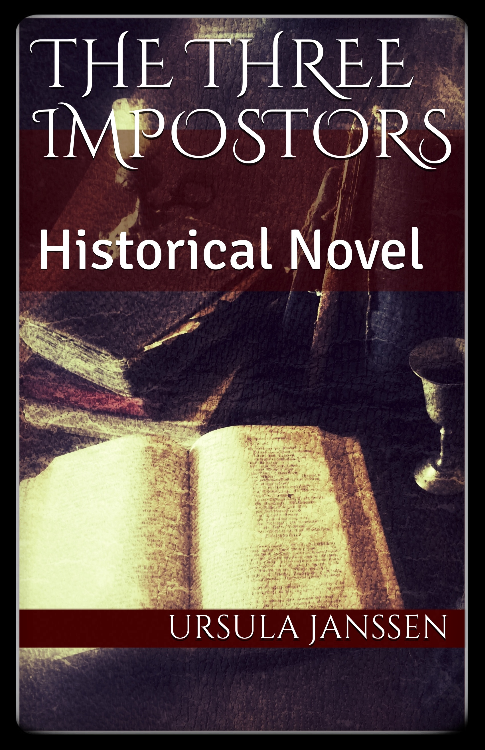Interview with Ursula Janssen
Author of The Three Impostors: Historical Novel
Ursula Janssen, born 1978, is an archeologist and freelance author and now lives with her husband and daughter in southern Italy, after spending several years living and working in various countries in Africa and the Middle East. She writes mostly historic novels but has also published a novel for young readers.
Buy this book
How would you describe The Three Impostors to a new reader?
- The Three Impostors is about a quest, a multi-layered journey through a little known time and a great parable on the big questions of life.
What was the inspiration behind The Three Impostors ?
- My inspiration was an article I read about the mysterious origins of the historical Treatise of the Three Impostors, an early critic approach towards religion of unclear content and even more unknown origins.
Which authors do you admire? How have they influenced your writing style?
- My absolute favorite is Umberto Eco. He certainly, I hope, influenced me both in my style and in my choice of subjects, although I tend to write considerably shorter, in a rather dense style.
To quote Umberto Eco: “The person who doesn’t read lives only one life: his own. The reader lives 5,000 years. (…) Reading is immortality backwards.”
Can you tell us a little about the locations in your book?
- The Three Impostors is set in Europe immediately before and after the end of the Thirty Year's War in the 17th century, a time of great despair and destruction, but also of new ideas. The protagonist's quest leads him from the Rhine to Prague and via the Alps, Venice and Florence to Rome.
What advice would you give to aspiring authors?
- Find an interesting subject that really inspires you and go for it!
What's your writing process?
- As an archaeologist, the historical accuracy of my novels is of great importance to me. That’s why I throughly study a subject before turning it into a novel. All the historical background behind the fictional plot, the literature mentioned, many of the characters, are factual. (An exception is my book “Eyewitnessed“ which is entirely factual and - despite being written in form of a novel - has no fictional elements in it.)
Actually I am enjoying this form of writing greatly: I research the subject I am interested in but then I take the freedom to fill in the voids with fiction, developing the plot and the characters within that historical framework.
Which character in The Three Impostors has had the greatest impact on readers?
- The Three Impostors is written from the viewpoint of the protagonist Hieronymus Bender, with whom the reader hopes, doubts, struggles and loves.
If The Three Impostors were to be adapted for TV or film, who would you see in the lead role? Who did you have in your mind’s eye when you wrote him/her?
- Oh dear, I'm not much of a film person, I always prefer the book to any adaption.
How have readers responded to The Three Impostors?
- I got some great reviews for the original German title "Die drei Betrüger". One of my favorite paragraphs is "For me, expertise is the keyword for this book. It is clear from every line. Behind every written sentence lurk a dozen unwritten ones with even more information. I like that. I very much hope that my opinion will be mainstream with it, but I fear that the fine work of Ursula Janssen will not land on every bedside table. I wish the author success and the courage to write even more such knowledgeable books."
Where next? What are you working on now?
- I haven't made my newest project public yet but I can say as much that it again requires a lot of research, this time even more in the line of my original profession as an archaeologist, but will be of great actuality nevertheless.
Synopsis
The quest for the legendary heretical Treatise of the Three Impostors leads the protagonist Hieronymus Bender through 17th-century Europe, torn apart by the Thirty Years' War, and allows him to make the acquaintance of a number of most illustrious contemporaries, including the future Pope Fabio Chigi, the Swedish ex-queen Christina, polymath Athanasius Kircher or the Jesuit priest Goswin Nickel. Bender finds it increasingly difficult to distinguish between friend and foe, as he finds himself surrounded by power games and intrigues. And what is this mysterious book about which the rivalling parties are so interested in that some are even prepared to jeopardize the peace that has just been concluded?

